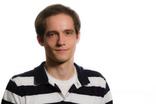Chip-Scale Terahertz Frequency Combs and Multiheterodyne Spectroscopy
Hosted By: Laser Systems Technical Group
06 December 2017 16:00 - 17:00
Eastern Time (US & Canada) (UTC -05:00)Quantum cascade lasers are semiconductor devices whose optical properties are determined by artificially-engineered band structures. Although they have long been able to act as compact sources in the mid-infrared and terahertz, recently there has been a spate of activity in the area of nonlinear devices based on quantum cascade structures. Their large optical nonlinearities enable a broad range of novel devices, including difference frequency sources, optical parametric oscillators, and broadband frequency combs. In this webinar hosted by the OSA Laser Systems Technical Group, Dr. David Burghoff will introduce key concepts and discuss some of the recent developments in this burgeoning field.
Dr. Burghoff will discuss the development of terahertz frequency combs based on quantum cascade lasers, which combine the high power of semiconductor lasers with the broadband capabilities of conventional sources. Optical frequency combs are light sources whose spectra consist of a large number of evenly-spaced lines, and their development has revolutionized high-precision metrology and spectroscopy. Although quantum cascade combs do not produce a train of pulses in the time-domain, the output is nevertheless periodic, and each line has a well-defined phase. These properties make quantum cascade combs extremely well-suited as sources for compact spectrometers.
Finally, Dr. Burghoff will discuss his recent work showing how these devices can be used to coherently measure terahertz spectra at high signal-to-noise ratios in just a few microseconds, using only chip-scale components. With signal processing, sensible spectra can even be measured with combs that are far less stable than are traditionally considered viable for coherent spectroscopy, even lasers operated in pulsed mode. Because these systems require no stabilization and no extraneous optical elements, they will enable the next generation of optical sensors and offer the possibility of complete spectrometers on-a-chip.
Presenter
Dr. David Burghoff, Massachusetts Institute of Technology

David Burghoff is a research scientist in the Research Lab of Electronics at the Massachusetts Institute of Technology. He received his bachelor’s in Electrical Engineering from University of Illinois at Urbana-Champaign, his master’s from Massachusetts Institute of Technology, and Ph.D in Electrical Engineering from Massachusetts Institute of Technology. His awards include the Intelligence Community Postdoctoral Fellowship and MIT's Jin Au Kong Outstanding Thesis Award. His research interests include quantum cascade lasers, terahertz spectroscopy, machine learning, and ultrafast optics.
